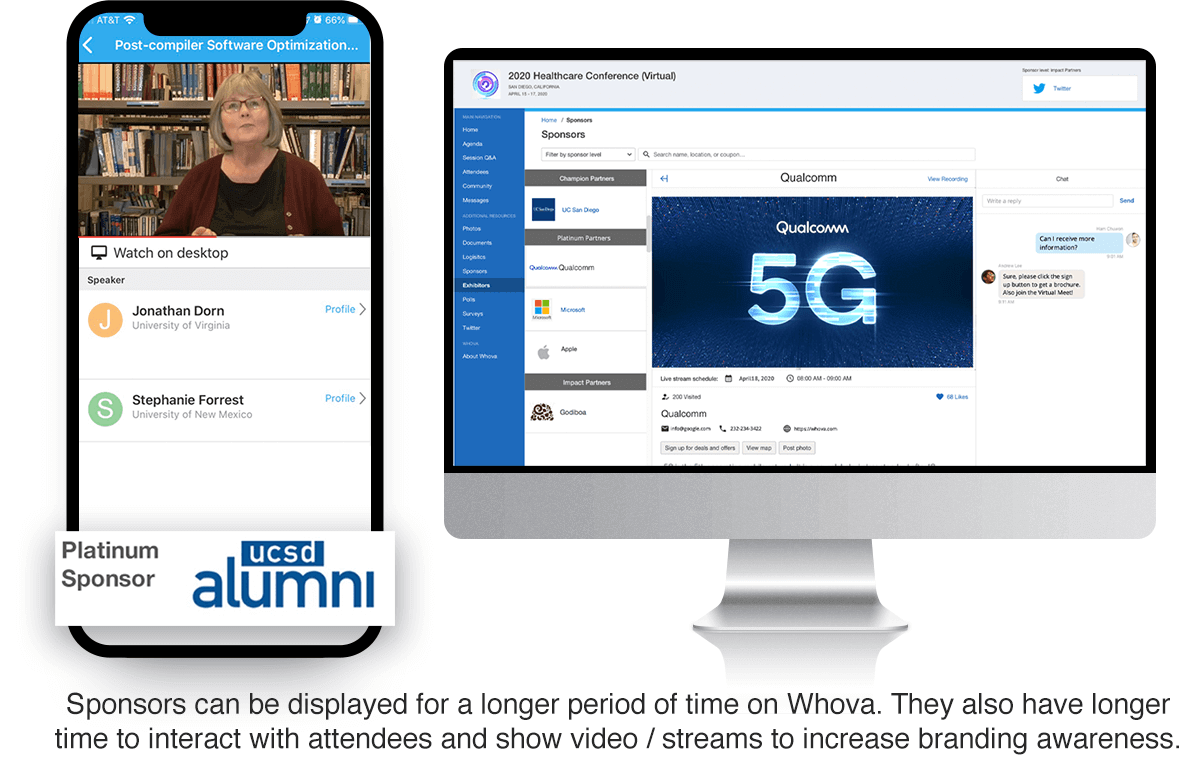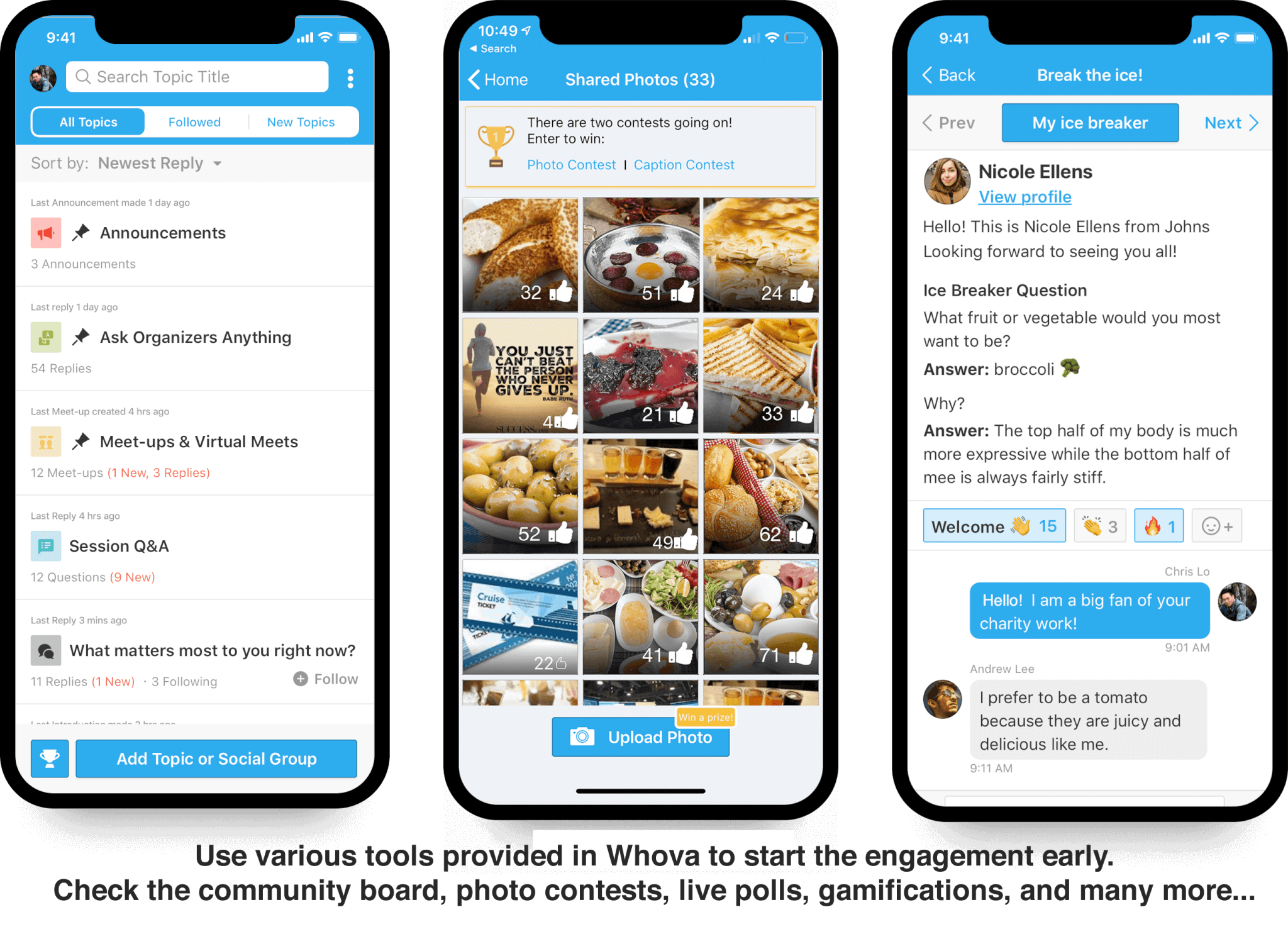Unfortunately, you have to tell others the event is postponed as you need more time to move it online. However, shouldn’t there be some ways to still make the event a success?
In fact, you can utilize the period leading up to your event to engage your participants, bringing them benefits while helping you minimize losses caused by a postponement. Read on to learn more.

Don’t Delay! 5 Reasons to Engage Early
Research shows that 96% of event attendees look for information prior to attending an event. That means they are ready, willing, and able to educate themselves on subject matter and learn about products and services to make their lives better. Take advantage of this openness for these five reasons:
1) Turn registrants into attendees
If you have an event scheduled for the summer and need to delay until the fall, keep in mind your attendees may get distracted by competing events, especially virtual ones. Simply ignoring your attendee list is a sure-fire way of telling people who’ve signed up for your event that you don’t care, making it more likely for them to decide to go elsewhere.
On the other hand, maintaining engagement with registrants in the weeks leading up to a rescheduled event keeps them in the mix, making it more likely they will actually attend your event and not somebody else’s.
2) Keep sponsors happy
Event sponsors need access to attendees in order to realize benefits of their expenditures. Without attendees, what reason to sponsors have to continue an affiliation with a delayed event? Ongoing interaction with registrants leading up to an event provides extra opportunities for sponsors to keep their names in front of their target audience, in some cases serving as a value-add for their event participation.
If you are using Whova for your event, that means the sponsor logos can be displayed for a much longer time before the event. At the same time, the sponsors have more time to use all the sponsor tools in Whova such as live streams, videos, chats, or virtual meetups to get more branding awareness.

3) Lead to an even more engaging event
If you’ve ever been to a concert, comedy show, or movie you likely have seen some type of warm-up act before the main attraction. This is done to get the audience more engaged and receptive to the artist’s performance, enriching the overall experience. It’s the same way with virtual events: you can use the time leading up to your event to warm up attendees, perhaps allowing them to get to know each other and leading to more active participation during the event day. Ongoing attendee communications touching on this aspect of their participation in your event is a low-pressure way to entice them to stay on track.
4) Minimize refunds
If an event registrant feels he or she is getting value out of their association with your event in the time leading up to it, they may be less likely to ask for a refund. This can help you avoid losing significant money if registration is a major revenue source.
5) Avoid negative branding
Having to postpone an event could be viewed by some as reflecting poorly on your organization, regardless of the reasons for its postponement. Engaging your registrants directly in the time leading up to a virtual or rescheduled in-person event wipes away this negativity, showing that you care, and can even be used to increase event participation, further driving revenue and sponsorships.
5 Ways to Engage Before Your Event
We’ve just shown why you shouldn’t postpone the engagement. Now here are some practical considerations for doing just that:
1) Send out different types of emails
Electronic communication is by far the easiest way of engaging attendees in the time leading up to an event. That said, individuals open emails because they think it will contain something of value for them. Shaking things up on a weekly basis helps; consider sending a newsletter one week, special offer the next week, then an event update, etc. Be sure to change subject lines, and send your emails on different days of the week. Avoid spamming attendees with multiple emails in the same week.
2) Create interactive forums for networking
Speakers in addition to attendees are sidelined when events cancel. Much like attendees, they are seeking opportunities to interact and share their knowledge. Give them an opportunity to reach your registrants via a live chat Q&A session, where attendees are given the opportunity to ask questions directly of the speakers, like a mini virtual event before your main event. If live chat is not an option, simply solicit questions from attendees via email, send them along to speakers, and then publish the resulting Q&A on your website to draw more eyes. You can use live chats and Facebook group pages to enable attendees to interact with one another as well, sharing leads and resources as appropriate.
If you are using event apps such as Whova, there are a lot of tools to help with the pre-event engagement. For example, you may use the community board to start discussions about the session topics, create a photo contest, make live pollings, and more.

3) Employ gamification
The events industry is all about the use of game mechanics to engage attendees, modify participant behavior, and accomplish event goals. Online scavenger hunts – sending your registrants to sponsor websites, speaker bios, industry websites to hunt for information – are easy ways to generate exposure for event stakeholders and create a sense of benefit to attendees.
4) Push social media
Social media marketing has evolved beyond branding to creating a sense of belonging and experience. This can translate into touchpoints and engagement with your attendees via a social media campaign surrounding certain elements of your event, targeting influencers to generate more exposure and potentially more signups.
5) Empower attendees to shape the event
After every event, attendees are asked for feedback in order to shape the next version of the event. With a delayed event, you have the opportunity to solicit feedback from attendees BEFORE the event itself. Send out a questionnaire with specific topics that you’d like to promote, and ask which ones attendees will be most interested in. This will help you figure out which elements of your upcoming event need work, while engaging attendees and getting them excited about your event.
Remember, safety is essential when deciding to cancel, reschedule, or transform an event from in-person to virtual. Don’t put attendees in the position of having to decide what to do; instead, give them reasons to stay engaged and on-track to participate. This will help avoid backlash from certain groups like your vendors and sponsors who’ve invested in your event, not to mention the attendees themselves.
If you would like to see how Whova can help with your virtual event, please feel free to request a free live demo here:
Related Case Studies
